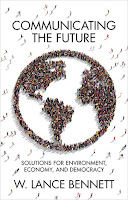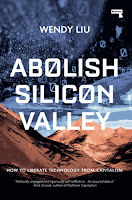.
Image: On Friday this past week we discussed an extremely interesting book in the ICT4S Reading Group
I briefly mentioned the ICT4S (ICT for sustainability) Reading Group in a recent blog post. The Reading Group (book circle) is a spin-off from the second ICT4S Summer School that was held in August last year. I was one of the five organizers of the Summer School but it was fellow co-organizer Jay Chen who came up with the idea and took responsibility for hosting and coordinating the Reading Group.
We have met once per month - a breakneck speed for reading academic books for most folks - but you don't have to join all meetings and can instead pick and choose what books to read and which meetings to join. There have been seven meetings since the Reading Group started (Sept-Dec and Feb-April) and the eighth and last meeting for the academic year 2021-2022 will be held in mid-May.
The Reading Group exists in the form of a mailing list, an online collaborative document (padlet), regular votes for what books to read next and of course the actual monthly meetings when we discuss the books. We seem to have stabilized at around 10 participants per meeting (down from 20 or 30 and the very first meetings when enthusiasm ran high). The books we have read and discussed this far are:
Autumn 2021:
- Jason Hickel - Less is More: How Degrowth Will Save the World (2021)
- Lance Bennett - Communicating the Future: Solutions for Environment, Economy and Democracy (2021)
- Kate Raworth - Doughnut Economics: Seven ways to think like a 21st-century economist (2017)
- Wendy Liu - Abolish Silicon Valley: How to Liberate Silicon Valley From Capitalism (2020)
Spring 2022:
- Sasha Costanza-Chock - Design Justice: Community-Led Practices to Build the Worlds We Need (2020)
- Tim Jackson - Post Growth - Life After Capitalism (2021)
- Jem Bendell & Rupert Read (eds.) - Deep Adaptation: Navigating the Realities of Climate Chaos (2021)
- Steffen Lange & Tilman Santarius - Smart Green World? Making Digitalization Work for Sustainability (2020) - NOTE: to be discussed on Friday May 13 at 17.00 Central European Time (08.00 Pacific Time)
Out of the eight books/meetings, the last meeting hasn't happened yet but I have read and participated in six of the seven meetings (the December book didn't fit my schedule).
Looking at the books in the list above, you would be excused if you thought this was a reading group about economics (or ecological economics or heterodox economics). Only one out of of the eight books decidedly treats ICT head-on (Lange & Santarius). Two other books are slightly more peripherally related to ICT and more related to business/society (Liu) and to design (Costanza-Chock). Out of the eight books, I had personally read three books before and independently of the Reading Group (Hickel, Raworth, Lange & Santarius). It was in fact me who proposed we should read Lange & Santarius and the suggestion to read Bennett was also mine (I had wanted to read it but hadn't yet at the time). Author Lance Bennett in fact joined us when we discussed his book!
Something that has been slightly stressful for me is that we have sometimes decided on the next book(s) to read very late, thereby reducing the time available to order the book and to read it. I prefer to buy books in batches and would thus have liked more foresight. I have therefore hounded Jay so that we will choose which books to read for the autumn at the last meeting before the summer. I would then order the books and might also read one or more already during the summer.
Out of the books above, I can wholeheartedly recommend Hickel as well as Bendell & Read. They were both amazing. Hickel has a way of explaining very complex matters in simple yet convincing ways and I can easily see students reading parts of all of his book. Bendell & Read was also amazing since they present arguments I have seldom seen elsewhere (e.g. "Deep adaptation is an agenda and framework for responding to the potential, probable or inevitable collapse of industrial consumer society due to the direct and indirect impacts of human-caused climate change and environmental degradation").
Also very good and well worth reading are Bennett, Raworth, Jackson and Lange & Santarius. I didn't read Liu and I didn't think much of Costanza-Chock for more than one reason; while the basic ideas were intriguing, I found that the book was quite extreme in how these ideas were presented and developed and didn't agree with some of the conclusions and suggestions. I also felt like parts of the book did not represent very good writing as they were boring. It sometimes felt excruciating to read with pages upon pages of arcane "who's who" lists that could only be of interest to those activists and groups mentioned in the text, or possibly to a "community historian" who want to track down detailed info about matters that are of great interest only to very few people.
On the whole, the Reading Group has been great though! The experience of coordinating your reading and then discussing the book you just read with others increases the value of reading a book, and I have surely, due to the added value, read books that I wouldn't have read otherwise. This text thus ends with an invitation: if you want to join the Reading Group, do send an email to Jay Chen (jchen@icsi.berkeley.edu) with "ICT4S Reading Group" in the header!
.









Inga kommentarer:
Skicka en kommentar